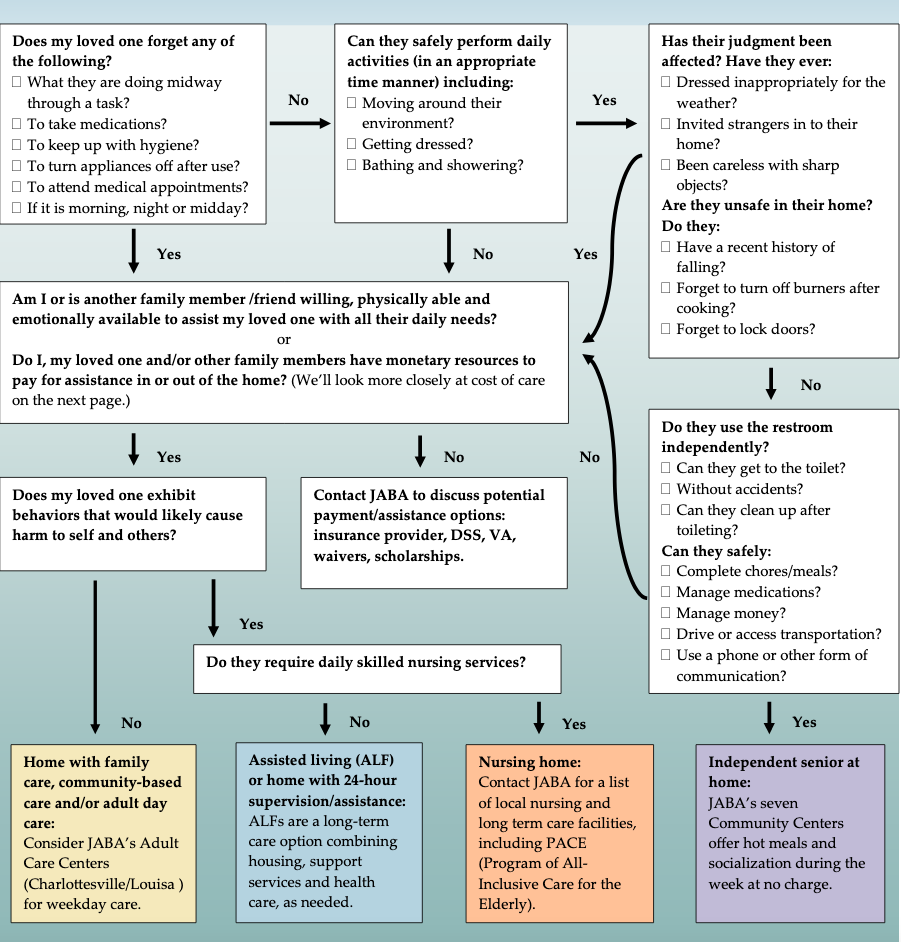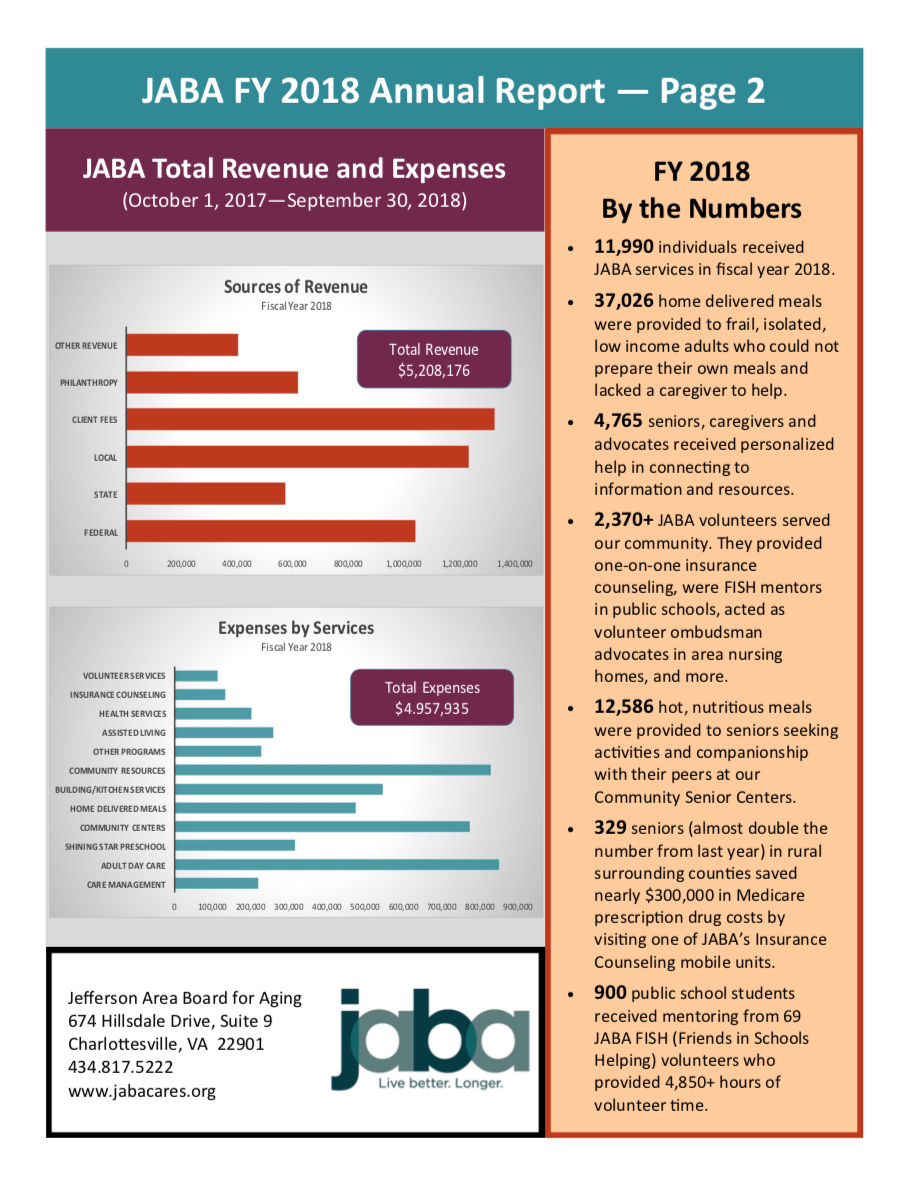When Lucy Garrison and her sisters suggested to their mother, Katherine Garrison, that she start going to JABA’s Adult Care Center, she — like so many older adults who need assistance — was at first reluctant to leave her home. But they already had been dealing with their mother’s physical problems from a stroke for more than a decade, had their own families and work lives to consider, and had begun to worry about her spending so much time alone in her condition.
“Mom had always been the caretaker and problem-solver in the family,” Lucy Garrison said, “and so it was understandable she didn’t want to go.”
Indeed, for many people like Katherine Garrison, the idea of going to an adult care center seems akin to entering an assisted living facility — something they may not want yet or be emotionally prepared to consider, even though the care they are now requiring at home may be a growing burden on their caregivers. It’s an unfortunate misconception, said Danielle Flippin, manager of JABA’s Adult Care Center in Charlottesville, because time spent at a center like JABA’s actually can help keep people like Katherine Garrison in their homes.
“People often think this is an assisted living facility, and that they are going to have to stay overnight,” Flippin said, “and we always have to reassure them that it’s not. In fact, many people can avoid having to move to an assisted living facility because of us.”
As Flippin points out, specialized care and an array of activities are available for older adults every weekday — even for those with Alzheimer’s or other forms of dementia — which can take a considerable burden off caregivers who are working or raising children, and drastically reduce the time spent alone at home.
“And it’s much more affordable than assisted living, or even in-home care,” Flippin said. “And coming here reduces the risk of social isolation.”
What’s more, Flippin says that caring for people during weekday hours only — 6:30 a.m. to 5:30 p.m. Monday through Friday — instead of having to house, feed and care for people 24/7, as assisted living facilities must do, allows the center to focus more on activity programming and personalized care.
It’s also worth noting that JABA’s Adult Care Center accepts Medicaid and veterans benefits and has scholarships and grants available to help people with specialized needs or who those who need financial assistance. In addition, many people might not know that the center is not just for older adults, and that anyone 18 or older with a disability is eligible to become a member.
Still, Flippin acknowledges that it isn’t primarily the misconceptions that prevent people from visiting the center, but rather the reluctance that older adults like Lucy Garrison’s mother have for leaving their homes and their routines, and relying on strangers for assistance.
“We encourage people to start slow, maybe a day or two, then build up,” Flippin said. “To me, it beats sitting at home all day with a caregiver, or on the couch watching TV.”
For Lucy Garrison and her sisters, it involved knowing their mom.
“Mom had always been the caretaker and problem-solver in the family,” Garrison said, “so we got her to go by telling her to think about it as a job, like going to work, and there would be things to do and accomplish. We knew we had to give a her a purpose.”
That was five years ago. Today, at 83, Katherine Garrison sits happily in the main room of JABA’s Adult Care Center in a comfy chair with her feet propped up and a fuzzy blanket across her legs, wearing a pair of bright red Converse high-tops. Her daughter said the family first bought her a pair when she started falling at home, as a younger athlete in the family suggested they would give her better ankle support, but the high-tops obviously became her thing.
“I have blue ones, black ones, green ones and gray ones, too,” Katherine Garrison said, turning slowly toward me with a slightly wry smile, looking at me intently, if not a bit skeptically, with her dark, intelligent eyes.
“I feel safe here,” she said. “It’s important to feel safe, and I like the people, and the music, and the food. I also have a great-niece who goes to the preschool next door.”
There are only two adult care centers in the greater Charlottesville area, both of which are operated by JABA — one located on Hillsdale Drive behind Toys R Us and the other at the Betty Queen Intergenerational Center in Louisa. JABA’s centers have something truly unique — adjoining preschools and programming that allows the children and center members to interact on a regular basis.
For individuals who need a higher level of care typically provided by nursing homes or long-term care institutions, Blue Ridge PACE — of which JABA is a partner — operates a specialized day program on Carlton Avenue that includes extensive medical and therapeutic services.
“The children can get members to do things we can’t get them to do,” Flippin said. “They see those smiling faces and they want to help, want to teach them, so we see them playing games, eating meals together, creating crafts and telling stories.”
While kids are often shy with the older adults at first, it doesn’t take long for them to break out of their shells, Flippin said. And she added that parents report that the kids treat older people differently in public after their experience at the center, smiling and saying hello more often. Of course, for members who’d rather not spend time with children, the center provides other activities when the preschool is visiting.
A look at the Adult Care Center’s daily activity calendar shows how much is going on. Ice cream socials with the preschool, special meals, holiday celebrations, field trips to museums and places like Carter Mountain Orchard, exercise classes, live music and other performances, outside visitors from schools and organizations, gardening, puzzles, games, movies, theme days and even the occasional Elvis impersonator.
“We are pretty entertaining here,” Flippin said with a smile.
“I was skeptical at first,” said Elinor Witcher, 82, a member for two years now who takes a JAUNT bus from her home on Prospect Avenue every weekday, “but then I started participating in all the activities.”
Witcher is fond of balloon ball, a game played with kids from the preschool; she loves all the live music, and playing bingo. “It makes my two daughters feel good that I’m here, and that I’m safe,” she said.
While an adult day care situation may not be right for everyone, and it’s up to families and individuals to make those difficult decisions, there’s a lot to be said for the way these programs help support the whole family.
“We see a lot more three-generation households now,” Flippin said, “and many caregivers who are still working and raising children. We’re here to let them know that you are not alone, and that we can help relieve the burden of caregiving.”
“Once we got her there, the socialization was very important, and it revived her, brought new life to her,” Lucy Garrison said of her mother. “The center has helped us in so many ways, giving her the personal interaction she needed, allowing us to keep her at home. … We can go to work … and we’re comfortable knowing she’s in a safe, loving environment. It’s a truly amazing program.”
This article originally appeared in the Daily Progress





